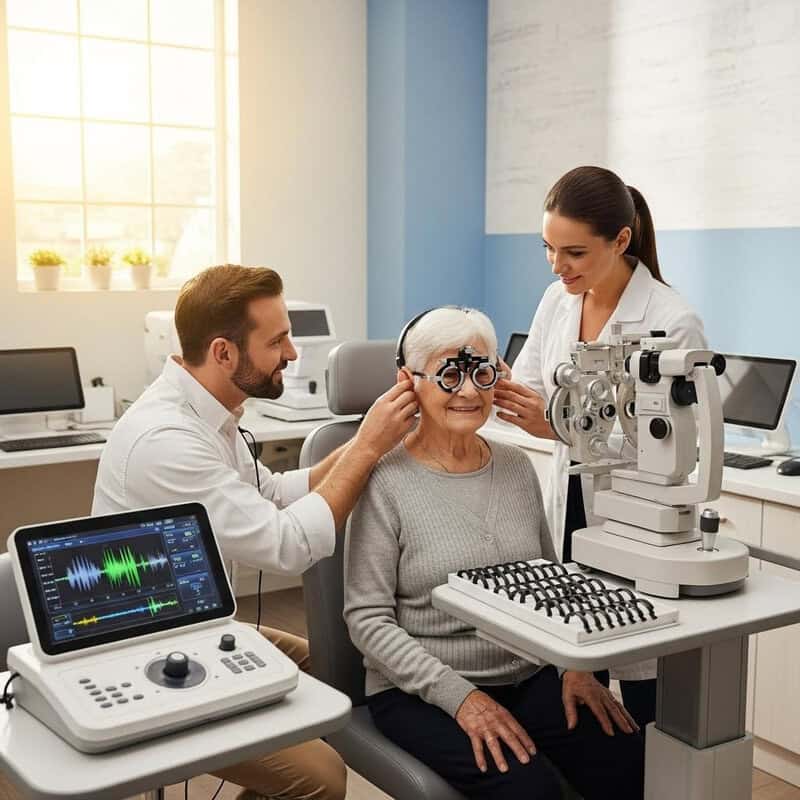As we age, habits that once seemed harmless—or even beneficial—can start to pose new risks to our health and wellbeing. With changing bodies and lifestyles, it’s crucial to regularly evaluate daily routines to ensure safety, independence, and vitality. Making thoughtful adjustments can help prevent falls, chronic illnesses, and cognitive decline. For more on healthy aging, visit the National Institute on Aging and CDC Healthy Aging resources.

17 Habits You Should Quit After Turning 70
1. Skipping Regular Health Checkups

As you age, annual health checkups become increasingly vital due to higher risks for conditions such as heart disease, cancer, and diabetes. Early detection of these illnesses significantly increases the chances of successful treatment and improved quality of life.
For example, identifying high blood pressure or early-stage cancers during routine visits can prevent serious complications. Prioritizing regular checkups also helps monitor medications and manage chronic conditions effectively. For more detailed recommendations, review the CDC’s guidelines for older adults at Healthy Aging: Get Your Checkup.
2. Ignoring Physical Activity

Adopting a sedentary lifestyle after 70 can accelerate muscle loss, reduce bone density, and decrease mobility, all of which raise the risk of falls and other health issues. While strenuous workouts may not be suitable for everyone, gentle exercises like walking, swimming, or chair yoga can help maintain strength, balance, and flexibility.
Even moderate activity has proven benefits for heart health and mental well-being. The National Institute on Aging recommends older adults stay active with activities suited to their abilities. Learn more at the NIA Exercise & Physical Activity Guide.
3. Isolating from Social Circles

Social isolation in later years can lead to increased risks of depression, anxiety, and cognitive decline. Staying connected with friends, family, and the broader community is crucial for emotional and mental well-being.
Engaging in community groups, volunteering, or using technology—such as video calls or social media—can help maintain social ties and prevent loneliness. These connections can also provide practical support and motivation for healthy habits. For more on the importance of social engagement, visit the AARP article on Social Isolation in Older Adults.
4. Skipping Medications or Self-Medicating

Forgetting to take prescribed medications or choosing to self-medicate with over-the-counter drugs or supplements can have serious consequences, including dangerous drug interactions and setbacks in managing chronic conditions. Unlike doctor-supervised care, self-medicating lacks professional oversight, increasing the risk of side effects or ineffective treatment.
Adhering to your physician’s guidance helps ensure medications work as intended and supports overall health. To learn how to safely manage medications and avoid common pitfalls, review the FDA’s Medication Safety Tips for Older Adults.
5. Neglecting Hydration

Older adults are more susceptible to dehydration due to a reduced sense of thirst and age-related changes in kidney function. Dehydration can lead to confusion, urinary tract infections, and even hospitalization.
To stay hydrated, drink water regularly throughout the day, and incorporate hydrating foods like fruits and soups. Avoid sugary drinks, which can spike blood sugar and add unnecessary calories, unlike water which is calorie-free and most effective for hydration. For more practical tips and guidance, visit the Mayo Clinic’s Hydration Advice.
6. Consuming Excessive Salt or Sugar

Excessive salt and sugar intake can significantly worsen high blood pressure, diabetes, and kidney function—conditions that often become more prevalent with age. Limiting processed foods, choosing fresh fruits and vegetables, and using spices or herbs instead of salt can make meals healthier.
Opting for water or unsweetened beverages over sugary drinks also reduces health risks. Monitoring and moderating these ingredients is crucial for maintaining optimal health. For more information on recommended intake and practical tips, consult the American Heart Association’s guidelines on sugar at How Much Sugar Is Too Much?.
7. Neglecting Sleep Routines

Poor sleep habits in older adults can lead to impaired memory, mood disturbances, and a weakened immune system. Erratic sleep schedules often disrupt the body’s natural rhythms, making it harder to fall and stay asleep. In contrast, maintaining a consistent bedtime and wake time can improve sleep quality and overall well-being.
Simple changes—like limiting screen time before bed and creating a calming nighttime routine—can make a significant difference. For further guidance on establishing healthy sleep patterns for seniors, visit the Sleep Foundation’s Sleep Guidelines.
8. Ignoring Mental Stimulation

Keeping the mind active is essential for reducing the risk of cognitive decline as you age. Activities like solving puzzles, reading books, or learning a new language or skill can help keep your brain engaged and sharp. Routine mental stimulation supports memory, problem-solving, and overall brain health.
Even socializing and playing strategy games offer cognitive benefits. The Alzheimer’s Association provides practical tips for boosting brain health and preventing cognitive decline. Discover more ways to keep your mind active at their resource: 10 Ways to Love Your Brain.
9. Avoiding Technology

Steering clear of technology can limit social connections and access to valuable health and safety resources. While traditional communication like phone calls or letters remains meaningful, using video calls, social media, and telehealth expands opportunities to stay connected with loved ones and healthcare providers.
Embracing technology also enables access to information, emergency alerts, and online learning. According to the Pew Research Center, technology use among seniors is on the rise, helping to combat isolation and improve quality of life. Explore more findings in their study: Technology Use Among Seniors.
10. Failing to Review Finances

Regularly reviewing your finances becomes even more important after 70 to protect against scams, fraud, and financial mismanagement. Proactive financial planning helps maintain independence and prevents stressful crisis management when unexpected expenses or issues arise.
Setting aside time for periodic check-ins with a trusted advisor or family member can catch irregularities early and ensure your budget aligns with your needs. The Consumer Financial Protection Bureau offers valuable resources to help older adults safeguard their assets and financial well-being. Learn more at CFPB Resources for Older Adults.
11. Ignoring Fall Hazards at Home

As mobility and balance decrease with age, the risk of falls and related injuries rises significantly. Simple home hazards like loose rugs, poor lighting, and cluttered pathways can lead to serious accidents. Making modifications—such as installing grab bars, securing carpets, improving lighting, and removing unnecessary obstacles—can greatly enhance safety and independence.
Regularly evaluating and updating your living environment is essential to prevent dangerous falls. The CDC provides comprehensive guidance and practical steps for fall prevention. Explore their tips at CDC Fall Prevention.
12. Driving Without Reassessment

Continuing to drive without regularly assessing your vision, reflexes, and the impact of medications can be dangerous for both yourself and others. Age-related changes may slow reaction times or impair judgment, making driving riskier. It’s important to evaluate your abilities honestly and consider medical advice before getting behind the wheel.
Alternatives like public transportation, rideshares, or community shuttles offer safe and convenient options. The AAA Foundation provides resources and self-assessment tools to help seniors make informed decisions about driving. For more information, visit AAA Senior Driving.
13. Putting Off Legal Planning

Delaying legal planning after age 70 can lead to stress, family disputes, and unfulfilled wishes if unexpected events occur. Keeping wills, powers of attorney, and advance directives current ensures your preferences are honored and loved ones are guided in important decisions.
Proactive legal planning also helps protect assets and clarifies health care choices. Consulting an attorney experienced in elder law can provide peace of mind and avoid complications later. For practical guidance and checklists, refer to the American Bar Association’s estate planning resources at ABA Estate Planning.
14. Overlooking Vision and Hearing Care

Declining vision and hearing can contribute to falls, accidents, and increased social withdrawal, making daily life more challenging and isolating. Regular eye and hearing exams help detect issues early, allowing for timely interventions like updated prescriptions, hearing aids, or treatments for underlying conditions.
These proactive steps support safety, independence, and social engagement. Ignoring sensory changes can impact everything from driving to enjoying conversations. For expert advice on preserving eye health as you age, visit the American Academy of Ophthalmology’s guide at Aging and Your Eyes.
15. Ignoring Pain or New Symptoms

Dismissing new aches, pains, or unusual symptoms as simply “getting older” can be risky, as these changes may indicate treatable medical conditions. Promptly reporting persistent discomfort, sudden weakness, or any unusual changes to a healthcare provider can lead to early diagnosis and more effective treatment.
Ignoring symptoms could delay care for issues such as infections, arthritis, or even heart problems. It’s important to listen to your body and seek professional advice. For more information on recognizing and managing pain in older adults, consult the NIH resource at Pain in Older Adults.
16. Avoiding Vaccinations

Vaccines become increasingly important as we age, providing vital protection against illnesses such as flu, pneumonia, and shingles. Older adults have a higher risk of complications from these diseases, making immunizations a key preventive measure. Skipping recommended vaccines can lead to severe illness, hospitalization, or even life-threatening outcomes.
Staying up to date with vaccinations helps maintain health and independence. Consult your healthcare provider about which vaccines are right for you. For a comprehensive list and timing of vaccines for adults, refer to the CDC’s adult immunization schedule at CDC Adult Immunization Schedule.
17. Dwelling on the Past or Regrets

Constantly ruminating on past mistakes or regrets can fuel depression, anxiety, and diminish your overall quality of life. Letting go of the past allows space for joy and new experiences. Mindfulness practices, such as meditation or journaling, and focusing on gratitude can foster a more positive outlook.
Cultivating acceptance and resilience are key to emotional well-being in your later years. Embracing the present and celebrating achievements, both big and small, can make aging a more fulfilling journey. Explore more positive aging strategies in Harvard Health’s advice on aging.
Conclusion

Letting go of outdated or risky habits after age 70 can significantly enhance your health, happiness, and independence. By reassessing routines and embracing positive changes, you can navigate this stage of life with greater confidence and vitality. Don’t hesitate to seek support from healthcare or legal professionals when making important decisions. Embracing a proactive, mindful approach helps ensure your golden years are safe, fulfilling, and joyful. For more guidance on healthy aging, visit resources like the National Institute on Aging.
Disclaimer

This article is for informational purposes only and does not constitute medical, legal, or financial advice. Please consult qualified professionals for guidance tailored to your individual needs.
